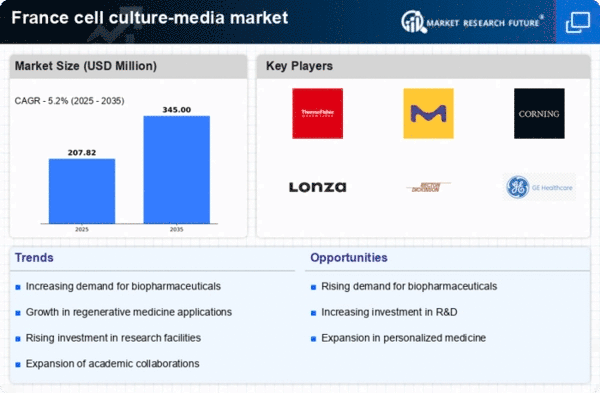Regulatory Framework Enhancements
The regulatory landscape surrounding the cell culture-media market in France is undergoing significant enhancements, which may positively impact market growth. Recent reforms aim to streamline the approval processes for biopharmaceutical products, thereby encouraging innovation in cell culture media development. In 2025, it is anticipated that new regulations will reduce the time required for product approvals by up to 30%, facilitating quicker market entry for novel cell culture media. This regulatory support is crucial for companies looking to introduce innovative solutions that comply with safety and efficacy standards. Furthermore, the French government is actively promoting initiatives that encourage compliance with international standards, which could enhance the competitiveness of the domestic cell culture-media market on a broader scale.
Rising Investment in Biotechnology
The cell culture-media market in France is experiencing a notable surge in investment, particularly from both public and private sectors. This influx of capital is primarily directed towards research and development initiatives aimed at enhancing biopharmaceutical production. In 2025, the French government allocated approximately €500 million to biotechnology research, which is expected to bolster the cell culture-media market significantly. Furthermore, private equity firms are increasingly recognizing the potential of biotechnological advancements, leading to a projected growth rate of 8% annually in the sector. This financial backing not only supports the development of innovative cell culture media but also facilitates collaborations between academic institutions and industry players, thereby fostering a robust ecosystem for biopharmaceutical research and production.
Growing Focus on Regenerative Medicine
The cell culture-media market in France is increasingly influenced by the expanding field of regenerative medicine. As the healthcare sector shifts towards therapies that promote tissue regeneration and repair, the demand for specialized cell culture media tailored for stem cell research and tissue engineering is on the rise. In 2025, the regenerative medicine market in France is expected to reach €1 billion, with a substantial portion of this growth attributed to advancements in cell culture technologies. This trend suggests that the cell culture-media market will need to adapt to meet the specific requirements of regenerative applications, including the development of media that support stem cell differentiation and proliferation. Consequently, this focus on regenerative medicine is likely to drive innovation and diversification within the cell culture-media market.
Increased Collaboration Between Academia and Industry
Collaboration between academic institutions and industry stakeholders is becoming increasingly prevalent in the cell culture-media market in France. This trend is driven by the need for innovative solutions to complex biological challenges. In 2025, it is estimated that over 60% of research projects in the biotechnology sector will involve partnerships between universities and private companies. Such collaborations facilitate the exchange of knowledge and resources, leading to the development of cutting-edge cell culture media that meet the evolving needs of researchers. Additionally, these partnerships often result in joint funding initiatives, which can enhance the overall research landscape. As a result, the cell culture-media market is likely to benefit from a continuous influx of novel products and methodologies that stem from these collaborative efforts.
Technological Advancements in Cell Culture Techniques
Technological innovations are playing a pivotal role in shaping the cell culture-media market in France. The introduction of advanced cell culture techniques, such as 3D cell culture and organ-on-a-chip technologies, is revolutionizing research methodologies. These techniques enhance the efficiency and effectiveness of drug development processes, leading to a growing demand for specialized cell culture media. In 2025, the market for 3D cell culture media alone is projected to reach €150 million, reflecting a compound annual growth rate (CAGR) of 10%. This trend indicates a shift towards more sophisticated and reliable cell culture systems, which are essential for accurate preclinical testing and personalized medicine applications. As researchers seek to replicate in vivo conditions more closely, the demand for innovative cell culture media is likely to escalate.


















Leave a Comment